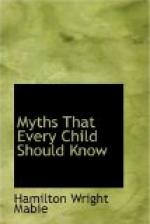Midas started up, in a kind of joyful frenzy, and ran about the room, grasping at everything that happened to be in his way. He seized one of the bedposts, and it became immediately a fluted golden pillar. He pulled aside a window curtain, in order to admit a clear spectacle of the wonders which he was performing; and the tassel grew heavy in his hand—a mass of gold. He took up a book from the table. At his first touch, it assumed the appearance of such a splendidly bound and gilt-edged volume as one often meets with, nowadays; but, on running his fingers through the leaves, behold! it was a bundle of thin golden plates, in which all the wisdom of the book had grown illegible. He hurriedly put on his clothes, and was enraptured to see himself in a magnificent suit of gold cloth, which retained its flexibility and softness, although it burdened him a little with its weight. He drew out his handkerchief, which little Marygold had hemmed for him. That was likewise gold, with the dear child’s neat and pretty stitches running all along the border, in gold thread!
Somehow or other, this last transformation did not quite please King Midas. He would rather that his little daughter’s handiwork should have remained just the same as when she climbed his knee and put it into his hand.
But it was not worth while to vex himself about a trifle. Midas now took his spectacles from his pocket, and put them on his nose, in order that he might see more distinctly what he was about. In those days, spectacles for common people had not been invented, but were already worn by kings: else, how could Midas have had any? To his great perplexity, however, excellent as the glasses were, he discovered that he could not possibly see through them. But this was the most natural thing in the world; for, on taking them off, the transparent crystals turned out to be plates of yellow metal, and, of course, were worthless as spectacles, though valuable as gold. It struck Midas, as rather inconvenient that, with all his wealth, he could never again be rich enough to own a pair of serviceable spectacles.
“It is no great matter, nevertheless,” said he to himself, very philosophically. “We cannot expect any great good, without its being accompanied with some small inconvenience. The Golden Touch is worth the sacrifice of a pair of spectacles, at least, if not of one’s very eyesight. My own eyes will serve for ordinary purposes, and little Marygold will soon be old enough to read to me.”
Wise King Midas was so exalted by his good fortune, that the palace seemed not sufficiently spacious to contain him. He therefore went downstairs, and smiled, on observing that the balustrade of the staircase became a bar of burnished gold, as his hand passed over it, in his descent. He lifted the doorlatch (it was brass only a moment ago, but golden when his fingers quitted it), and emerged into the garden. Here, as it happened, he found a great number of beautiful roses in full bloom, and others in all the stages of lovely bud and blossom. Very delicious was their fragrance in the morning breeze. Their delicate blush was one of the fairest sights in the world; so gentle, so modest, and so full of sweet tranquillity, did these roses seem to be.




